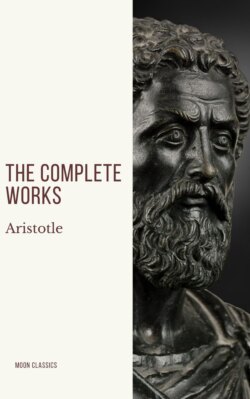Читать книгу Aristotle: The Complete Works - Aristotle - Страница 138
На сайте Литреса книга снята с продажи.
33
ОглавлениеScientific knowledge and its object differ from opinion and the object of opinion in that scientific knowledge is commensurately universal and proceeds by necessary connexions, and that which is necessary cannot be otherwise. So though there are things which are true and real and yet can be otherwise, scientific knowledge clearly does not concern them: if it did, things which can be otherwise would be incapable of being otherwise. Nor are they any concern of rational intuition-by rational intuition I mean an originative source of scientific knowledge-nor of indemonstrable knowledge, which is the grasping of the immediate premiss. Since then rational intuition, science, and opinion, and what is revealed by these terms, are the only things that can be ‘true’, it follows that it is opinion that is concerned with that which may be true or false, and can be otherwise: opinion in fact is the grasp of a premiss which is immediate but not necessary. This view also fits the observed facts, for opinion is unstable, and so is the kind of being we have described as its object. Besides, when a man thinks a truth incapable of being otherwise he always thinks that he knows it, never that he opines it. He thinks that he opines when he thinks that a connexion, though actually so, may quite easily be otherwise; for he believes that such is the proper object of opinion, while the necessary is the object of knowledge.
In what sense, then, can the same thing be the object of both opinion and knowledge? And if any one chooses to maintain that all that he knows he can also opine, why should not opinion be knowledge? For he that knows and he that opines will follow the same train of thought through the same middle terms until the immediate premisses are reached; because it is possible to opine not only the fact but also the reasoned fact, and the reason is the middle term; so that, since the former knows, he that opines also has knowledge.
The truth perhaps is that if a man grasp truths that cannot be other than they are, in the way in which he grasps the definitions through which demonstrations take place, he will have not opinion but knowledge: if on the other hand he apprehends these attributes as inhering in their subjects, but not in virtue of the subjects’ substance and essential nature possesses opinion and not genuine knowledge; and his opinion, if obtained through immediate premisses, will be both of the fact and of the reasoned fact; if not so obtained, of the fact alone. The object of opinion and knowledge is not quite identical; it is only in a sense identical, just as the object of true and false opinion is in a sense identical. The sense in which some maintain that true and false opinion can have the same object leads them to embrace many strange doctrines, particularly the doctrine that what a man opines falsely he does not opine at all. There are really many senses of ‘identical’, and in one sense the object of true and false opinion can be the same, in another it cannot. Thus, to have a true opinion that the diagonal is commensurate with the side would be absurd: but because the diagonal with which they are both concerned is the same, the two opinions have objects so far the same: on the other hand, as regards their essential definable nature these objects differ. The identity of the objects of knowledge and opinion is similar. Knowledge is the apprehension of, e.g. the attribute ‘animal’ as incapable of being otherwise, opinion the apprehension of ‘animal’ as capable of being otherwise-e.g. the apprehension that animal is an element in the essential nature of man is knowledge; the apprehension of animal as predicable of man but not as an element in man’s essential nature is opinion: man is the subject in both judgements, but the mode of inherence differs.
This also shows that one cannot opine and know the same thing simultaneously; for then one would apprehend the same thing as both capable and incapable of being otherwise-an impossibility. Knowledge and opinion of the same thing can co-exist in two different people in the sense we have explained, but not simultaneously in the same person. That would involve a man’s simultaneously apprehending, e.g. (1) that man is essentially animal-i.e. cannot be other than animal-and (2) that man is not essentially animal, that is, we may assume, may be other than animal.
Further consideration of modes of thinking and their distribution under the heads of discursive thought, intuition, science, art, practical wisdom, and metaphysical thinking, belongs rather partly to natural science, partly to moral philosophy.
